I’ve been learning Chinese for almost two years now. These are the techniques I’ve been using.
Group classes
When I first started learning Chinese I went to an evening class at King’s College once a week, for about 20 lessons in total.
While an in-person class isn’t necessary, there are a few advantages:
- enforces discipline with regular lessons
- you don’t have to think about what to learn next
- teacher can answer questions
- you meet other people to speak Chinese with
The classes I went to had between 5 and 15 people. The total cost was £418. While not free this is fairly affordable.
This is a good way to get started, even though it’s not very flexible and sometimes less fun than deciding what to learn on your own.
Online 1-on-1 classes
I tried this, but my teacher didn’t really have a plan for what I should work on and we had sound quality problems with Skype. I paid £140 for 10 classes. That’s pretty cheap for 1-on-1 instruction, which may explain the low quality teacher.
However, with a different company/teacher you might have a very different experience. I’m interested in trying italki sometime.
Offline 1-on-1 classes
For the last 3 months I’ve been taking in-person classes in Shanghai. I’ve been going about once a week for 100 minutes.
The total cost is for 20 classes was £415, or around £140 a month. While quite expensive for China, I did really like the classes and my teacher.
Going to a class not only forces you to learn regularly, but also makes you learn the things you find boring (personally I really dislike grammar). And, of course, doing the class 1-on-1 means you’re always engaged, and you can ask any questions you have.
At first I found this really exhausting, because trying to stay focussed for the whole time is difficult. But it really helped my Chinese.
Textbooks
The group class I went to was using “Chinese Express: Talk Chinese”. After finishing the classes I continued with the book, and am now working with the “Practice Chinese” sequel.
Using a textbook gives you structure. There won’t suddenly be a lot of new words, and as the lessons progress you keep using the words from the previous chapters.
It combines vocabulary, grammar, and cultural notes into one integrated place.
The downside is that there’s no flexibility, so it’s less fun and less tailored to your interests.
I find using a textbook useful, especially for learning the grammar.
Mobile apps
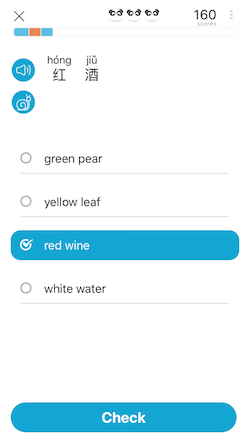
I’ve been occasionally using ChineseSkill and Learn Chinese (Mandarin) on iOS.
The great thing about apps is that you can practice anywhere whenever you have a few minutes to spare. And you get instant feedback on your answers.
They also have games, which makes the experience more fun.
However, I find they often tend to be focussed on inflexible phrases and out-of-context words.
I’m a huge paper addict though, so your experience with apps may be different.
Paper vocabulary tests
I love making myself paper vocabulary tests. Grade me!
Making the test helps me as much as taking it later on. I usually fold the a piece of paper and then write write the English words or phrases on the left and the Chinese answers on the right. Like this:
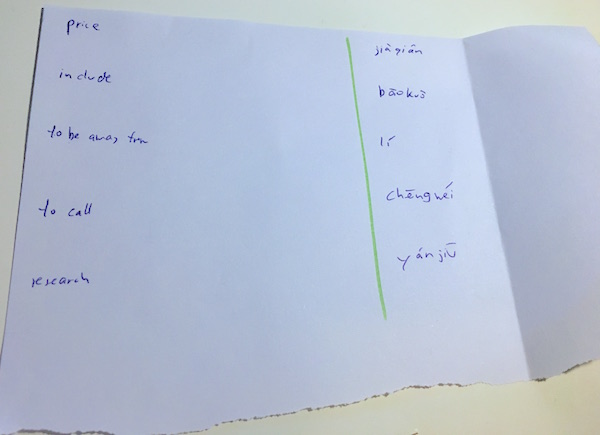
Then I fold the paper, take the test, and unfold it to check my answers. Ideally the full workflow is something like this:
- Write the test
- Fold so answers are hidden
- Go through the test in your head until you get all answers
- A day or two later do the test with written answers
- Grade the test and move any phrases you got wrong into a new test
Songs
Learning songs is fun, because they’re meant to be listened to over and over, and you get to spend your practice time singing.
I also quite enjoy cute things, so I’ll happily learn nursery rhymes or watch children’s cartoons. These tend to be more accessible as a beginner, though with a bigger time investment you can also learn something more adult appropriate.
Ideally you can find a pinyin video on Youtube or Yabla (see below).
Here are a few songs I liked, from easiest to hardest:
Liang zhi laohu Two tigers
Shui guo Fruit song
Xiao tu zi guai guai Little well-behaved rabbit
Ku bu chulai Tears don’t come out
Ai ni Love you
Shi nian 10 years
I’ve managed to build up a pretty impressive vocabulary relating to relationships and heartbreak!
Yabla
Yabla is two things:
- a dictionary with a vocabulary trainer
- videos with Chinese and English subtitles
It costs $9.95 a month, and I think it’s totally worth it.
Yabla vocabulary trainer
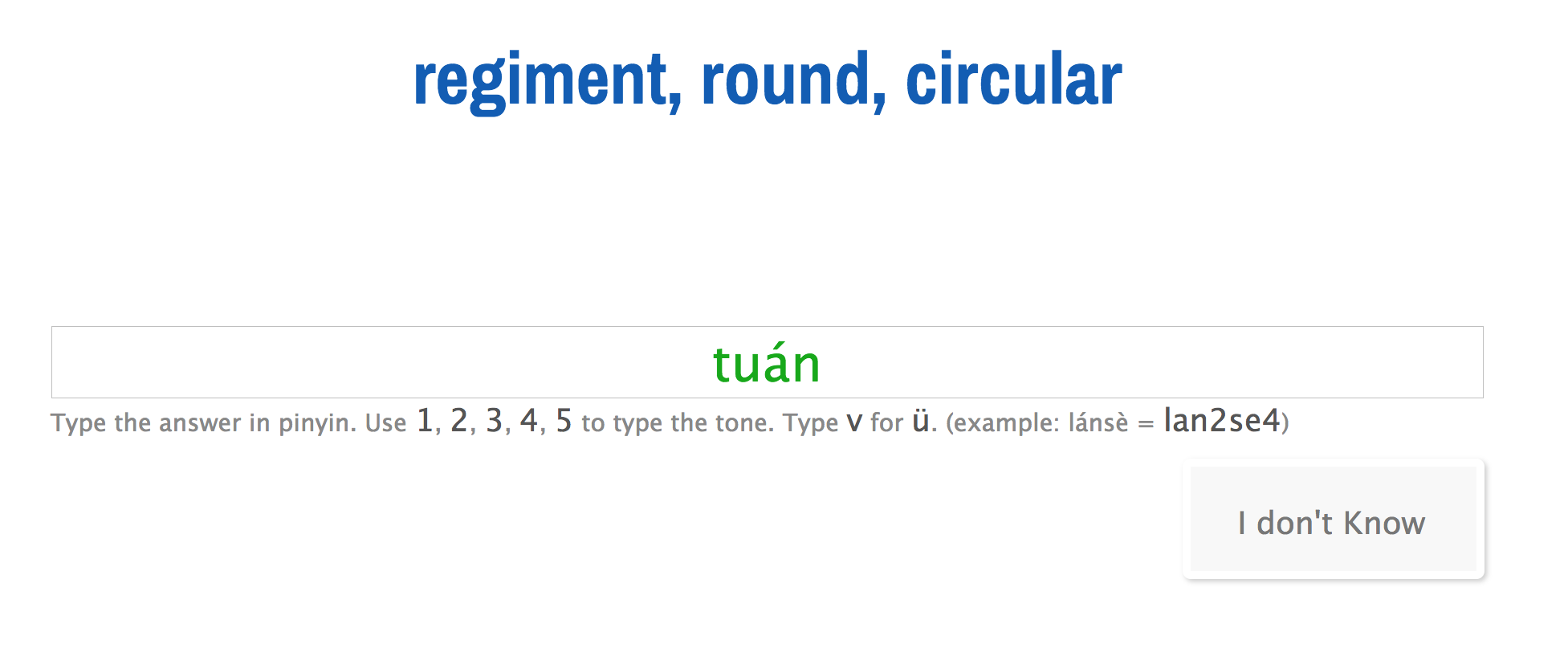
Three nice things about the vocabulary trainer:
- it also makes you type the words instead of just using multiple choice
- tracks the size of your vocabulary
- handles spaced repetition for you
The vocabulary trainer is not available on mobile app though.
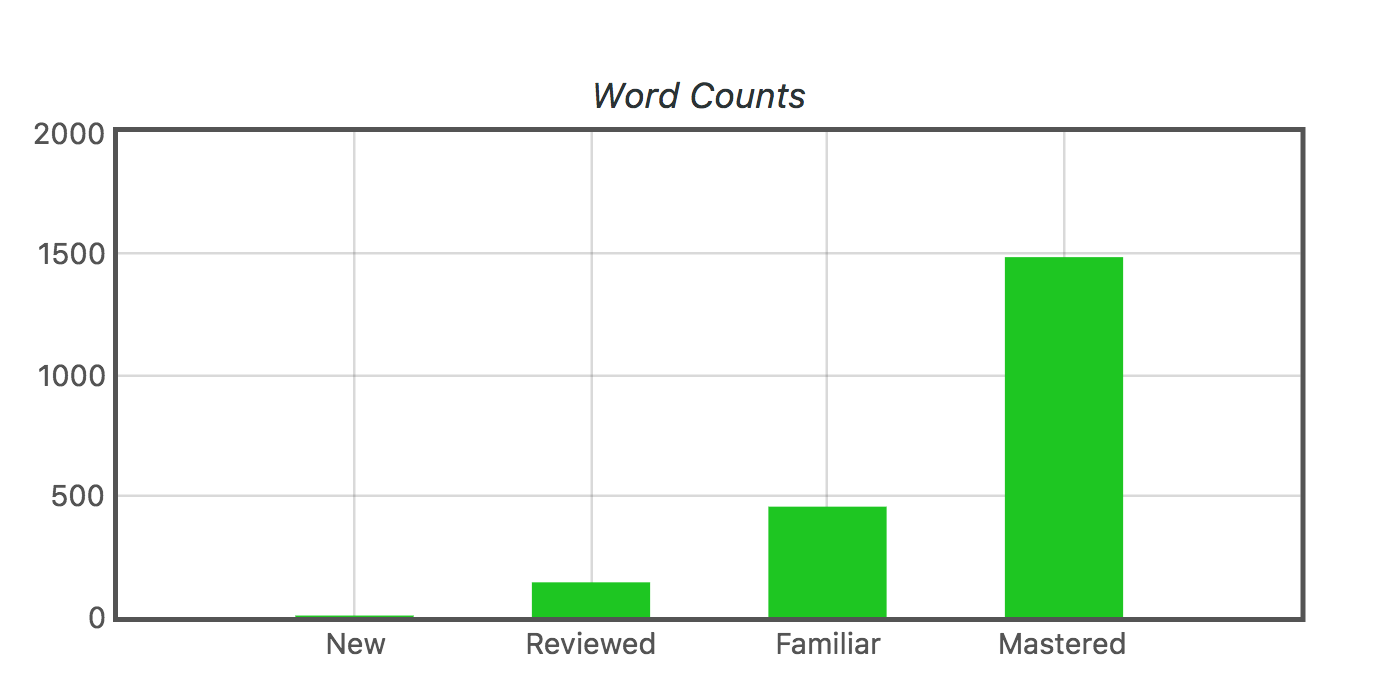
Yabla videos
Yabla has a set of videos taken from mostly real-world Chinese content. They range from Chinese documentaries, to comedy and content specifically for language leaners.
You can click on each word, see the translation, and add it to the vocabulary trainer.

Since it’s real-world content it’s also very useful to find example sentences containing a word you’re trying to learn, as well as checking that a word you’ve looked up in the dictionary is actually used the way you want to use it.
It will probably take you a few weeks to finish a video.
Notes in your apartment
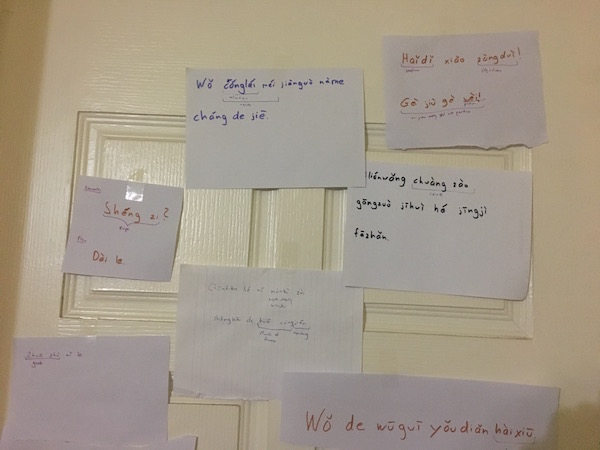
I’ve got notes with Chinese sentences all over my apartment. Most of the time I ignore them.
But:
- writing them down helps memorize the sentences
- when I’m brushing my teeth I’ll get bored and read some chinese phrases
- they remind me why I was learning a word
It often happens that I’m just beginning to memorize a word, but I already forgot what context I saw the word in and why I wanted to learn it. Then I walk through my flat and see that Mark Zuckerberg was talking about people not having devices/qijian to use the internet with.
Adding to all that, it’s satisfying to take off the note after a few months when I feel confident that I won’t forget the phrase anymore.
Labelling things and integrating words into day-to-day life
If you learn the word to say for an object, put a label on the thing!
Also, look up the words you write down often, like for a shopping list or for regular items in your calendar. Then every time you need to write the word try to use the Chinese translation.
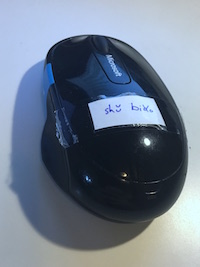
Learning real content that you’re interested in
This can take months for one video. Just like with songs, this involves a lot writing down the Pinyin, looking up all the words, and listening over and over.
Here are two things I’ve been working on:
The nice thing about the Mark Zuckerberg video is that he speaks nice and slow. He also uses business/technology vocabulary that I’m interested in.
I’m about to finish the Octonauts video and will put the Pinyin transcript on my website soon (here it is). The porcupine puffer, or mi ban ci tun, was saved in the end!
Google translate
I love Google translate.
It’s great for looking up Chinese text. It not only translates - the translation is often pretty bad - but it shows you the pinyin!

Instead of searching individual words in a dictionary Google Translate lets you search for whole sentences and takes the context of the word into account.

No, it’s not always perfect. But you can try different sentences containing the same word and see how it goes. If you’re still not sure, search Google for the translated text to see if Real Chinese People use it.
Writing stories
Just watching videos and reading Pinyin texts can be a bit passive, so a good way to mix things up is to use the words you know to write stories.
I usually write about how my teddy bear applied for his Chinese visa, or what happened when my coworker’s dog met a giant dragon who couldn’t find his way back to his apartment. (They bought a map, found the dragon’s home, and cooked dinner together.)
Talking to people
I think this is useful, but for me it’s a tiny part of my learning. Until recently my Chinese wasn’t good enough for me to communicate what I was trying to say, or for me to understand Chinese speakers. I was happy if I could successfully ask if something was spicy.
But this also really depends on the availabilty of Chinese speakers, and how comfortable you are having a conversation that has a very low chance of a successful outcome. Having a Chinese friend with you in case things go haywire is helpful.
I think I’m not a good example to follow here :)
Motivation
Here’s what I find motivating, ordered from least to most:
- learning from a textbook
- learning a song or video
- preparing for a trip to China
- living in China
- working in a Chinese environment
While moving to China was very motivating for me, it did not really make learning the language much easier.
Yes, it’s nice to have easy access to Chinese speakers, but for the most part my Chinese wasn’t sufficient to communicate with them. They understood my Chinese about as well as my cuddly turtle does. But I feel that’s slowly improving now.
I also don’t have to speak Chinese at work, or anywhere really. English is always an option (or asking a Chinese person to do the talking for me). If had to use Chinese at work that would really help me learn the language. It would also make me pretty useless at my job for a while.
Chinese films
It can be fun to watch Chinese films with English subtitles. I usually don’t put a lot of effort into understanding the Chinese, but it’s nice to catch the occasional word while still being able to relax.
Podcasts
I don’t really listen to many Chinese-related podcasts. But they can also be a low-effort passive way to learn the odd word here and there.
For example, sometimes I listen to Two White Chicks In China. It’s not really about the language, but you learn the odd word, like ayi, or why people say “a” or “la” at the end of a sentance.
Pinyin and Chinese characters
Pinyin is what’s used to write Chinese words in latin characters. It tells you how to pronounce a word. It’s also used to type Chinese text on a phone or computer.
Learning how to pronounce Pinyin properly is pretty boring, so I’ve been pretty lazy about it. Recently I’ve been working on it more though, since Chinese people were struggling to understand my Chinese.
Having a teacher and other Chinese speakers was really helpful for this. I’ve asked half the office to listen to my tingchechang (parking lot), dujiaoshou (unicorn), and qianduan chengxuyuan (front-end developer).
Unfortunately, being able to read and write Chinese is pretty much separate from being able speak it. I’ve been focussing on learning to speak the language, so this hasn’t been a priority.
Writing Chinese characters every now and then can be fun though and add a bit of variety. If you’re struggling to memorize a specific word over and over, practice the character for a bit to see if that helps.
Giving up on a learning project isn’t failure
After three weeks of trying to learn a song you might get bored and give up on it. That’s fine, you still learned something from it. It’s better to give up and move on to something more exciting than to start losing interest in the language and stop learning altogether.
Save the song somewhere in Spotify so you get the occasional reminder.
The same goes for forgetting words over time. I’d struggle to sing past Wo xiang ku danshi ku bu chulai, dengdao whatever… But maybe a different video will soon help remind me of the words in the song, and if I revisit the song in half a year it will be pretty easy.
Combine all the things
Overall my Chinese learning consists of a combination of all the techniques above.
For example, to learn song:
- write down the lyrics
- practice singing it
- add the words to Yabla
- make a vocabulary test
- put a note with lines from the song on your bathroom mirror
- sing it to your mum and your work colleagues
